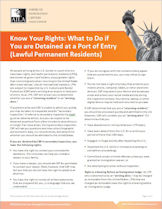Know Your Rights: What to Do If You Are Detained at a Port of Entry (LPR)
All people arriving at the U.S. border or a port of entry have basic rights, and lawful permanent residents (LPRs), also known as green card holders, enjoy greater rights than non-immigrants when returning to the United States after travel abroad. Like all international travelers, LPRs are subject to inspection by U.S. Customs and Border Protection (CBP) when arriving at an airport or land port of entry. As an LPR, CBP will screen you to determine whether you are a “returning resident” or an “arriving alien.”
If questions arise and CBP is unable to admit you quickly, you may be taken to a separate area for “secondary inspection.” A referral to secondary inspection by itself is not an adverse action, but you can expect to be detained anywhere from a few minutes to several hours or longer if an issue arises. During secondary inspection, CBP will ask you questions and may collect biographic and biometric data, run record checks, and determine whether you should be admitted to the United States.
If you are detained by CBP in secondary inspection, you have the following rights:
- You have the right to contact your consulate for assistance. The consulate can help you contact a lawyer or your family.
- If you have a lawyer, you should ask CBP for permission to contact your lawyer. Note, however, that CBP may tell you that you do not have the right to speak to an attorney.
- You have the right to review all written statements that are prepared for you, in a language that you can understand.
- If you do not agree with the contents of any papers that are presented to you, you may refuse to sign them.
- You do not have a right of privacy that protects your mobile phone, computer, tablet, or other electronic devices. CBP may search your device and access your email and screen your social media activity during the inspection process. Your phone, laptop, or other digital device may be held and returned to you later.
If CBP determines that you are a “returning resident”, you should be processed quickly and admitted to the U.S. However, CBP will consider you an “arriving alien” if it determines that you:
- Have abandoned or relinquished your LPR status;
- Have been absent from the U.S. for a continuous period of more than 180 days;
- Engaged in illegal activity after departing the U.S.;
- Departed the U.S. while in removal proceedings or extradition proceedings;
- Committed certain criminal offenses unless you were granted an immigration waiver; or
- Are attempting to enter without inspection.
Right to a Hearing Before an Immigration Judge
An LPR who is deemed to be an “arriving alien”, may be charged as removable from the United States. LPRs that are charged as removable have the right to a hearing before an immigration judge.
Abandonment of Residence/LPR Status
CBP may attempt to convince you that you abandoned your residence because of your absence from the United States and may urge you to sign a Form I-407, Record of Abandonment of Lawful Permanent Resident Status. However, it is important to know:
- You cannot lose your LPR status solely because of time spent abroad.
- An LPR remains an LPR unless the government proves abandonment by clear, unequivocal, and convincing evidence and an order of removal is issued by an immigration judge and becomes final.
- Form I-407 must be signed voluntarily. You may refuse to sign the form and there are no negative consequences if you refuse to sign it.
If CBP believes that you abandoned your U.S. residence and you refuse to sign a Form I-407, CBP must issue you a Notice to Appear (NTA) before an immigration judge who will determine if you have abandoned your U.S. residence. CBP cannot make this decision on its own.
If CBP believes that you abandoned your U.S. residence and you sign a Form I-407, you still have the right to request a hearing before an immigration judge.
If CBP takes your permanent resident card, you have the right to other evidence of your LPR status, such as a stamp in your passport.
Future Travel. To avoid delays at the ports of entry or legal issues in the future, you should consult with an immigration attorney prior to traveling if you:
- Have a criminal record (criminal convictions or a pending criminal charge).
- Have an application pending with U.S. Citizenship and Immigration Services (USCIS) or the Executive Office for Immigration Review (EOIR).
- There is anything in your immigration history that was not disclosed during your immigration process or that might cause a government official to question you about the reason for your travel or about your immigration history.
Questions? Want to Avoid Delays in the Future? Contact an Experienced Immigration Lawyer
To avoid delays at a port of entry or legal issues in the future, it is important to consult with a qualified immigration lawyer. Call immigration attorney Jessie M. Thomas at (214) 838-0045 or contact Law Office of Jessie M. Thomas office for answers.

